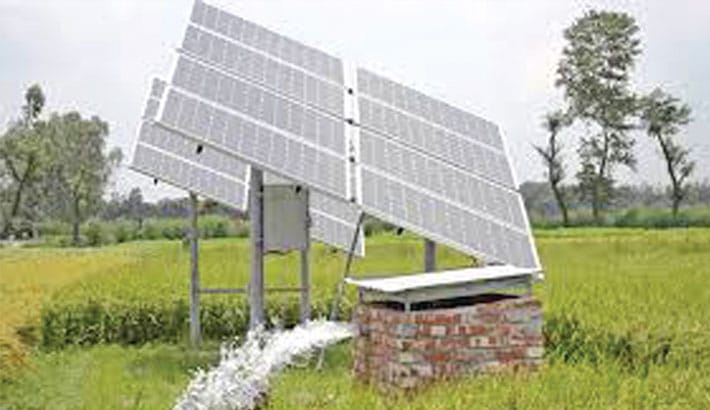The Asian Development Bank (ADB) has placed a $1.59 billion solar irrigation roadmap for Bangladesh to help replace diesel-fired irrigation system with that run by renewable energy.
The ADB submitted the draft proposal before Power Division last month and suggested that the cost may be met from national sources like Nationally Determined Contributions (NDC) and from the money being spent on diesel import together with grants and loans from foreign sources.
At a recent meeting, a representative from ADB delivered a presentation on key issues of the roadmap.
In the roadmap ADB proposed the following three different components for installing solar irrigation pumps: Replacing diesel pumps with solar pumps, hybridization of grid-connected pumps by incorporating solar panels, decentralizing ground mounted SPV systems on agricultural land.
A portion of the cost is also to be met by farmers and sponsors in the form of equity and debt, it said.
In case of component, financing has been proposed to be 50 percent of total cost during the initial period.
In case of second component, 30 percent of grant financing has been proposed during pilot phase. For the last component, it has been suggested that 20 percent grant financing may be considered for farmers in order to promote uptake.
Power Cell Director General Mohammad Hossain, who attended the meeting, said that the farmers in Bangladesh have a tariff slot.
At the current slab, they are availing a tariff that is the lowest in the country, he said.
“Anything beyond that will make them uncomfortable in spite of the grant portion. As we have a national policy and according to that policy, the farmers are availing the lowest tariff, we may rethink the model keeping this tariff unchanged.”
Whatever grant is required, we will have to make it available for them in order to keep the tariff unchanged, he pointed out.
At this point, REB Chairman Major General (Retd) Moin Uddin, said that pumps operated by diesel are mostly in remote areas, where there is no electricity connection.
“So, it would not be possible to feed the extra electricity into the grid,” he said.
Dr Akram H Chowdhuny, Chairman of Barind Multipurpose Development Authority (BMDA) said that they have installed solar panels for 107 LLP and 2 deep tube wells. “We have 16,000 deep tube well pumps throughout Rangpur and Rajshahi divisions. BMDA had an intention of turning all the irrigation pumps into solar pumps but the peasants are very poor.”
There is not much provision for loan as the payment becomes very high for them, he said, adding, they would be able to install solar irrigation pumps if there is 60-65 percent of grant and 35 percent of loan.
Chairman, BMDA further suggested that it should be done through a farmers-driven solar irrigation multi stakeholder platform. Therefore, ADB needs to develop a multi stakeholder platform by including not only REB and BMDA but also the farmers, he said.
At this point, Enamul Karim, representative from IDCOL said that they have installed 1,500 pumps and are offering lower tariff to farmers as compared to diesel pumps. IDCOL grant is 50 percent, he informed.
“If tariff needs to be like grid electricity, then 65-70 percent grant will be required,” he said.
DG, Power Cell said that where grid electricity is available, tariff should be similar to that of electricity there. “Where grid is not available, tariff should be lower than diesel. But there is challenge. If grid goes there afterwards, the farmers will try to shift from solar to grid electricity.”
The Power Division proposed that ADB may prepare a new model by simulating all these existing models like BMDA and BADC, which would add value to the existing practices, and in the end makes the roadmap attractive for users and investors alike.
Recent past Power Division Secretary Dr Sultan Ahmed, who also attended the meeting, said the commitment of NDC about reducing 5 percent GHG emission is embedded in all the development work of our country.
So, unconditional funds for NDC cannot be targeted for financing of solar irrigation systems, he said. “If ADB manage separate fund from external sources for solar irrigation then it may work. In that ease, ADB will have to put this kind of strong statements in the roadmap with specific mention as to how much GHG emission would be offset by installing solar irrigation pumps.”

